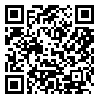Sat, Jan 31, 2026
[Archive]
Volume 14, Issue 42 (2021)
J Med Edu Dev 2021, 14(42): 11-19 |
Back to browse issues page
Download citation:
BibTeX | RIS | EndNote | Medlars | ProCite | Reference Manager | RefWorks
Send citation to:



BibTeX | RIS | EndNote | Medlars | ProCite | Reference Manager | RefWorks
Send citation to:
Mahajan A S. Do faculties remain motivated after attending medical education workshops and what innovations do they bring about at workplace?. J Med Edu Dev 2021; 14 (42) :11-19
URL: http://edujournal.zums.ac.ir/article-1-1421-en.html
URL: http://edujournal.zums.ac.ir/article-1-1421-en.html
Department of Physiology and Department of Medical Education, Maulana Azad Medical College, New Delhi, India. , aartis_mahajan@yahoo.co.in
Abstract: (5255 Views)
Background & Objective: Faculties attend medical education workshops to gain knowledge and skills. A need was felt to assess the sustainability and type of motivation status of the participants and whether they brought about a change in their workplace over a period of 6 months after the training.
Materials & Methods: A longitudinal prospective, analytic, questionnaire based follow up study was conducted in 60 faculty volunteers who attended a revised basic course workshop on medical education technology. The motivation status was recorded post workshop baseline (0 months), at 2 and 6 months after the workshop. They were also asked to report any innovations initiated in their workplace.
Results: The motivation parameters of External regulation increased from Mean (SD) of 1.89(1.14) to 2.84(1.59), p=0.001 and 3.07(1.55), p<0.001 at 2 months and 6 months. Amotivation increased from 2.37(1.43) to 3.15(1.47), p=0.012 and 3.10(1.53), p=0.020 at 2 and 6 months respectively. Work self-determination index (WSDI) decreased from baseline to 6 months from 17.69(7.65) to 14.02(8.51), p=0.046. Work non self-determined motivation (W-NSDM) increased from baseline, 2.86(1.09), to 3.56(1.24) p=0.004 at 2 months and 3.63(1.19), p=0.001 after 6 months. There was significant correlation between innovation scores and Intrinsic Motivation, Integrated Regulation, Identified Regulation, Work Self-Determination Index and Work Self-Determined Motivation at 2 and 6 months and Introjected Regulation at 2 months.
Conclusion: The faculty’s change in motivation status suggests that it was related to goals, targets and awards. Perceived changes related to teaching and assessment methods in workplace was also reported.
Materials & Methods: A longitudinal prospective, analytic, questionnaire based follow up study was conducted in 60 faculty volunteers who attended a revised basic course workshop on medical education technology. The motivation status was recorded post workshop baseline (0 months), at 2 and 6 months after the workshop. They were also asked to report any innovations initiated in their workplace.
Results: The motivation parameters of External regulation increased from Mean (SD) of 1.89(1.14) to 2.84(1.59), p=0.001 and 3.07(1.55), p<0.001 at 2 months and 6 months. Amotivation increased from 2.37(1.43) to 3.15(1.47), p=0.012 and 3.10(1.53), p=0.020 at 2 and 6 months respectively. Work self-determination index (WSDI) decreased from baseline to 6 months from 17.69(7.65) to 14.02(8.51), p=0.046. Work non self-determined motivation (W-NSDM) increased from baseline, 2.86(1.09), to 3.56(1.24) p=0.004 at 2 months and 3.63(1.19), p=0.001 after 6 months. There was significant correlation between innovation scores and Intrinsic Motivation, Integrated Regulation, Identified Regulation, Work Self-Determination Index and Work Self-Determined Motivation at 2 and 6 months and Introjected Regulation at 2 months.
Conclusion: The faculty’s change in motivation status suggests that it was related to goals, targets and awards. Perceived changes related to teaching and assessment methods in workplace was also reported.
Keywords: Faculty development, Motivation, Innovation, Self-determination, Teacher training, Academic training, Medical faculty
Article Type : Orginal Research |
Received: 2021/02/17 | Accepted: 2021/06/19 | Published: 2021/09/7
Received: 2021/02/17 | Accepted: 2021/06/19 | Published: 2021/09/7
Send email to the article author
| Rights and permissions | |
 |
This work is licensed under a Creative Commons Attribution-NonCommercial 4.0 International License. |





